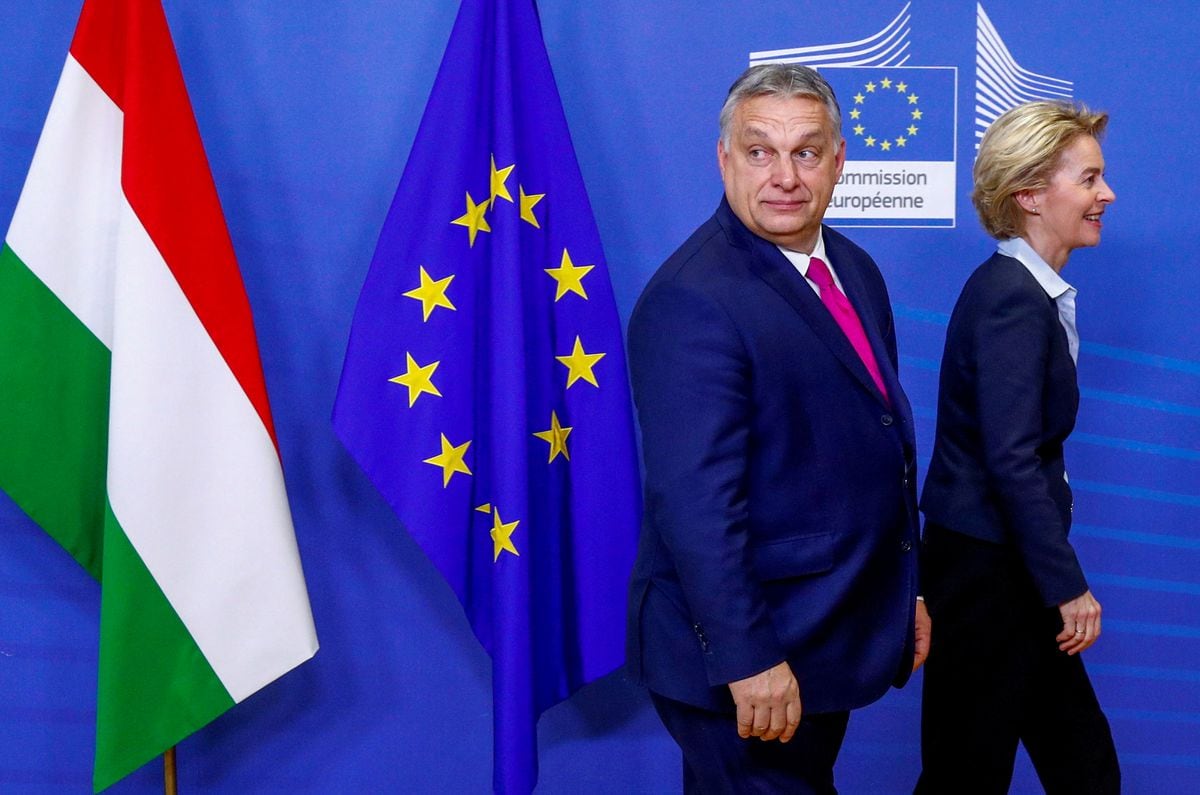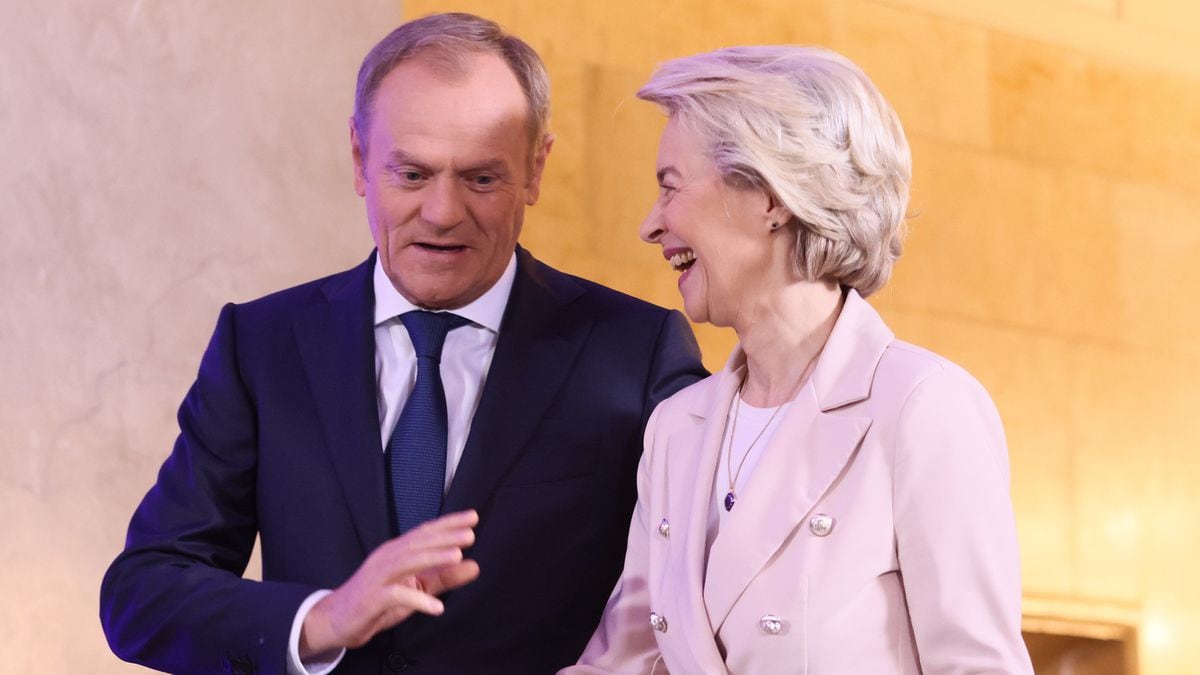Authoritarian drifts in the European Union can be very expensive from now on.
The Court of Justice of the EU (CJEU) has validated the community regulation that, since January 1, allows European funds to be suspended in countries where the fragility of the rule of law does not guarantee their proper management.
The Hungarian government of Viktor Orbán and the Polish government of Mateusz Morawiecki, who feel they are in the crosshairs of the new norm, had contested its adoption.
But European judges have ruled in favor of the regulation in a case that the court itself has described as "exceptional importance" and "undeniable constitutional relevance."
The extraordinary nature of the lawsuit has also been highlighted with the live broadcast of the reading of a verdict for the first time in the 70-year history of the European court based in Luxembourg.
"The entire court dismisses the appeal and orders Hungary to pay its costs and those of the European Parliament and the European Council", the rapporteur judge solemnly read for the first case.
Immediately afterwards, the same words have been repeated rejecting, in identical terms, Poland's appeal.
The affairs of each country, despite having been substantiated jointly, have been taken into account separately by European justice.
More information
Brussels demands for the first time guarantees from Hungary and Poland on the protection of European funds
In this high-voltage political and legal affair, Hungary and Poland accused the Council of the EU and the European Parliament of having approved a regulation without an adequate legal basis for the sole purpose of punishing certain countries with the excuse of protecting the community budget. .
For Budapest and Warsaw, Brussels had overstepped the limits and sought to punish both countries by avoiding the arduous procedure of article 7, which requires the unanimity of all community partners to sanction countries that violate the fundamental values of the EU.
The Luxembourg-based court has highlighted in its decision that the mechanism has been adopted on an adequate legal basis, in accordance with the procedure provided for in Article 7 of the EU Treaty and that it respects the limits of the competences attributed to the Union and the principle of legal certainty.
“The sound financial management of the Union budget and the financial interests of the Union can be seriously threatened by the violation of the principles of the rule of law that occurs in a Member State”, he highlights in his reasoning.
Consequences of the violation of the rule of law
The ruling considers that this violation may mean, among other consequences, that the expenses covered by the budget do not respond to the objectives pursued by the Union when it finances them.
Thus, a “horizontal conditionality mechanism” —such as the one that Warsaw and Budapest sought to prevent— “which makes access to financing from the Union budget subject to respect for the principles of the rule of law” has a perfect place within the powers which the EU enjoys to establish “financial rules” that supervise budget execution.
The parliamentary rapporteurs in the legislative processing of the regulation have demanded that the president of the European Commission, Ursula von der Leyen, immediately launch the files against Hungary and Poland to cut those two countries the multimillion-dollar aid they receive each year and that they have contributed to the electoral popularity of the Fidesz and PiS governments, two parties that have been able to afford generous social benefits in recent years.
"The rules are already clear and the only way is respect for the rule of law," said the socialist MEP Eider Gardiazábal, who was part of the parliamentary team that drafted the regulation.
Von der Leyen has celebrated the decision.
“We will act with determination when the conditions are met”, he has assured after the judicial validation of the norm.
But to take that step he has set two conditions.
First, the approval of the community guidelines on the application of the regulation, a text stuck in the Commission for more than a year.
And secondly, “the promise” that Brussels will not lose any case in relation to this regulation.
In other words, Von der Leyen will only take action against Hungary and Poland once he has reliable evidence that certain violations of the rule of law endanger the community budget.
Budapest response: “Brussels abuses its power”
The Hungarian Minister of Justice, Judit Varga, has reacted immediately to the decision: "THE CJEU has issued a politically motivated sentence for the Child Protection Law", she has assured on social networks, referring to the Hungarian norm approved on last year that prohibits the media and educators from providing children with information related to LGBTI groups, strongly criticized by Brussels.
“The decision is irrefutable proof that Brussels is abusing its power,” she added.
"I find it extremely shocking how the Hungarian government's communication in relation to EU issues ignores reality," Hungarian MEP Katalin Cseh, a member of the liberal Renew family in the European Parliament, replied in an appearance.
"Varga links things that have absolutely nothing to do with this sentence."
Greens MEP Daniel Freund regrets that "the Commission President's words do not point to immediate action."
For now, Von der Leyen has resigned from participating this Wednesday in the debate on the rule of law scheduled for the plenary session of the European Parliament.
Petri Sarvamaa, MEP of the popular group (the same as Von der Leyen), has described as "a shame" the absence of the president, attributed by her team to the instability in Ukraine and the need for her to be in Brussels, instead of Strasbourg.
The European Public Prosecutor's Office, one of the sources through which the Commission can detect violations of the principles of the rule of law, denounces the lack of collaboration from Warsaw in a letter sent this Wednesday to the Community Executive.
"Poland has systematically rejected requests for judicial cooperation from the European Public Prosecutor's Office since the beginning of its operations," the letter states.
This organization, whose activity started in 2020, has 22 participating States, but neither Hungary nor Poland are among them.
The latter country has 23 open investigations, "the largest number of all non-participating member states," the letter indicates.
The so-called conditionality mechanism, a tool approved in December 2020 to ensure that not one euro of recovery funds ends up in the hands of those who break the rule of law, entered into force in January 2021. But the European Commission had committed to Poland and Hungary not to activate it until the CJEU gave its approval.
The unruly neighbors to the east – with a long history of battles with Brussels on account of the rule of law, with issues ranging from the independence of judges to respect for the LGBT community – defended during a hearing before the plenary assembly of the Luxembourg court, held in October, that the regulation did not serve to create a budget rule, but rather had given rise to “a procedure with political content and significance and a “mechanism of political evaluation” with which Brussels intended to interfere in its internal affairs.
The hearing was an event of extraordinary repercussion, held before the plenary of judges of the CJEU.
The European Commission and a long list of member states that were considered affected, including Spain, Germany and France, also participated.
The EU's advocate general, who ruled in December, had already proposed declaring inadmissible or dismissing all claims from the two countries.
Although he admitted that some parts of the rulebook were creaky, he chose to accept it completely.
Finally, the scales of justice have fallen on that side.
Follow all the international information on
and
, or in
our weekly newsletter
.









